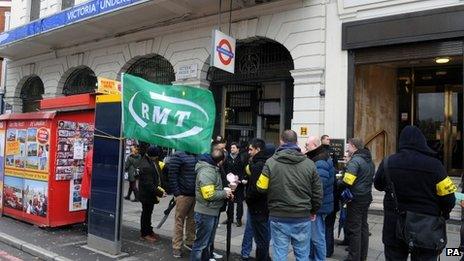Tories to consider new strike ballot law in 2015 manifesto
- Published

Some politicians want a 50% turnout threshold for strike ballots
The Conservatives could tighten the law on strike ballots if they win the next election.
Downing Street said the issue was "on the table" after Prime Minister David Cameron told MPs he wanted to see fewer "unnecessary" strikes.
Mayor of London Boris Johnson has called for strikes to be illegal unless at least 50% of staff in a workplace participate in a ballot.
RMT boss Bob Crow said calls for fixed thresholds were "hypocritical".
Under the current law, a strike can take place if it is backed by a simple majority of those balloted.
In the case of the recent 48-hour strike Tube strike, 77% of RMT members who voted in the ballot backed action.
But the number of eligible RMT union members who took part was lower, at 40%, while London Underground said only 31% of the total workforce had actually voted in favour of the action.
Economic damage
The CBI has argued that 40% of union members balloted would have to support a strike before it could go ahead.
Ministers have so far shied away from talk of changing strike laws but the recent stoppage - called in protest at plans to close ticket offices and axe 750 jobs - has prompted renewed calls for action.
Asked about the matter by Tory MP Bob Blackman at Prime Minister's Questions, Mr Cameron suggested he would consider a change to the law.
"When you see how many people rely on these essential public services, the time has come to look at what changes we can make to see if it is possible to see fewer of these strikes in the future," he said.
No 10 later said the matter would be considered as the party drew up its manifesto for the 2015 general election.
"We will look at what things can be done to improve existing legislation and protect people from the kind of strikes we saw on the London Underground," a spokesman said.
'Rotting fish'
At the moment, only members of the armed services, the police, and prison officers - regarded as essential public services - are prohibited by law from taking industrial action.
The BBC understands that officials are examining tightening the rules governing strike ballots to give unions less flexibility on the timing of strike action and to widen the justification for a strike after a ballot is held.
Rather than a specific threshold, it is believed Downing Street prefers other options - such as minimum service agreements, used in France and other European countries - to limit the number of days of strikes possible.
Mr Crow, general secretary of the RMT union, accused senior Tories of "rank hypocrisy" over the issue, saying Mr Johnson had been elected to his office with the support of just 17% of people entitled to vote.
"Once again we see right-wing politicians lining up to try and impose voting thresholds on trade unionists that none of them would dare subject themselves to at the ballot box," he said.
"The rank hypocrisy of those who want to impose one form of democracy on the working class while clinging on to another form of democracy for their own political class stinks like a case of rotting fish."
Manuel Cortes, from the TSSA union, said 55% of his members who took part in the Tube strike ballot had backed action, adding that Mr Cameron and Mr Johnson could "only dream" of such a level of support.
- Published6 February 2014
- Published5 February 2014
- Published4 October 2010